中考英语《状语从句》总结复习课件(共31张PPT)
文档属性
| 名称 | 中考英语《状语从句》总结复习课件(共31张PPT) |
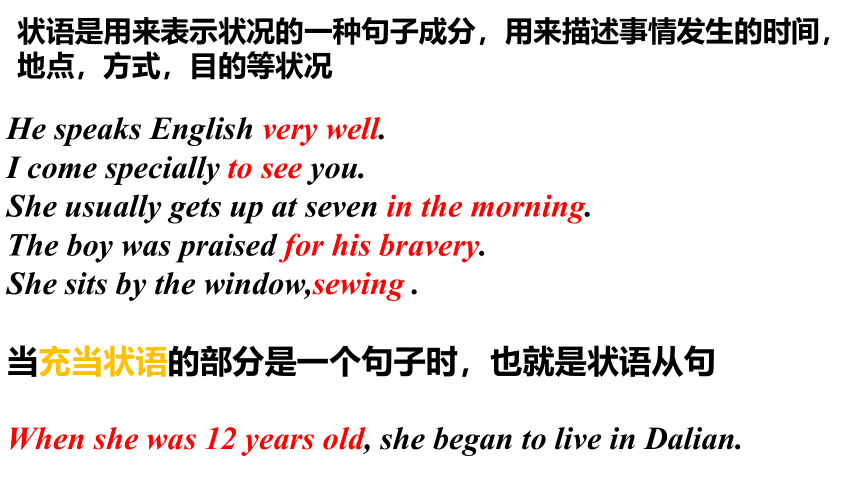
|
|
| 格式 | pptx | ||
| 文件大小 | 747.7KB | ||
| 资源类型 | 教案 | ||
| 版本资源 | 通用版 | ||
| 科目 | 英语 | ||
| 更新时间 | 2023-05-21 17:36:56 | ||
图片预览

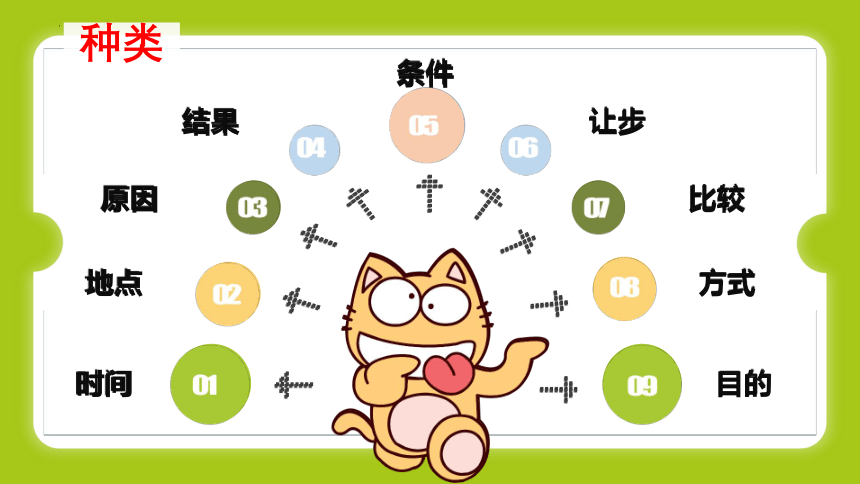
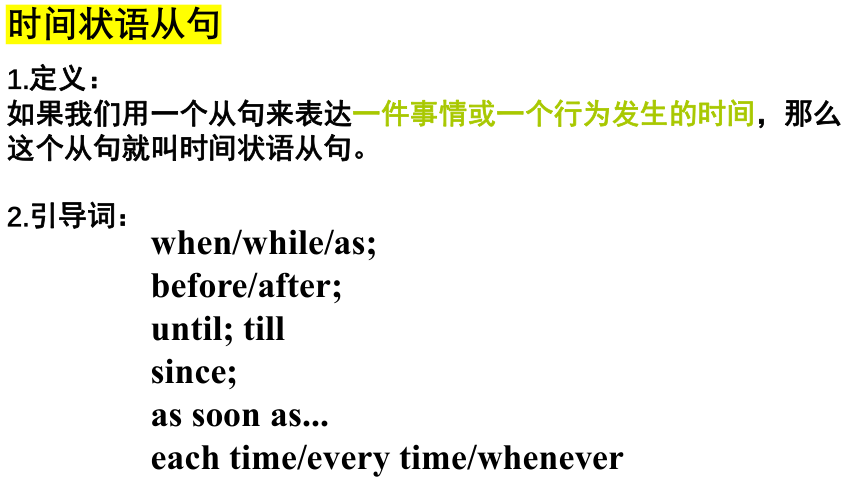
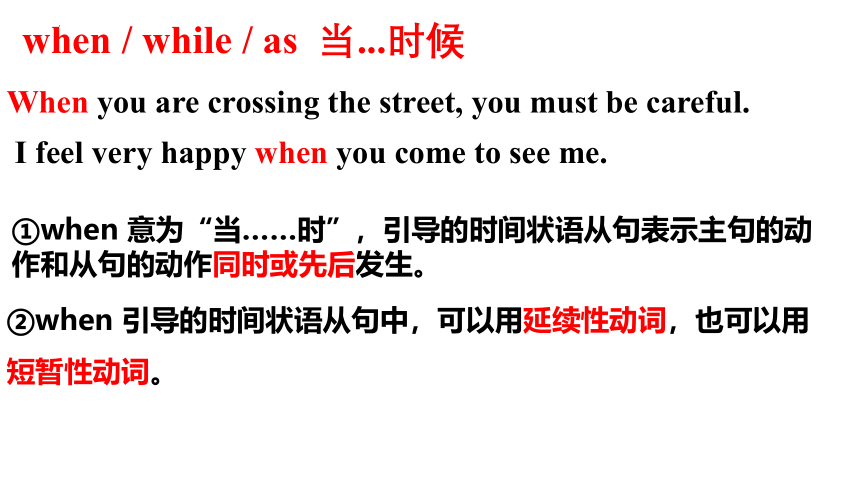
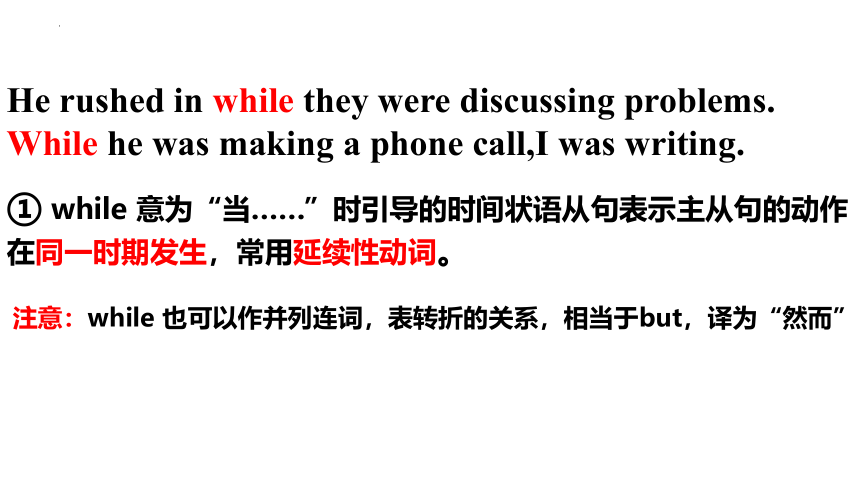
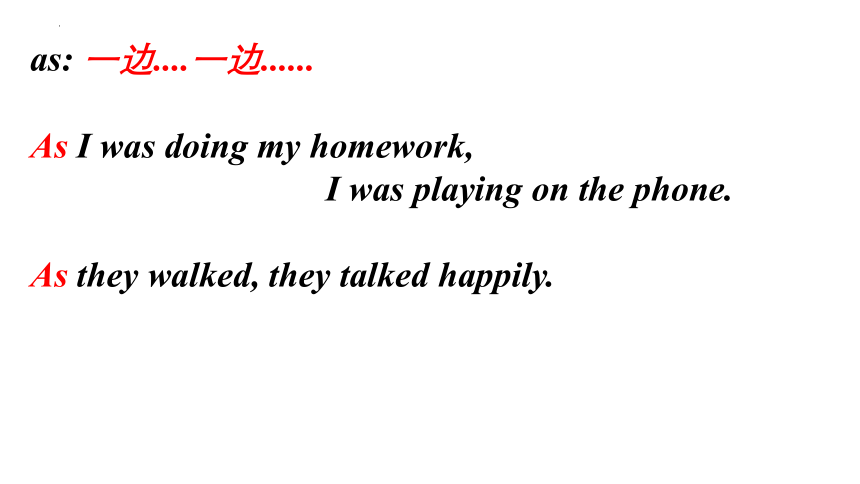
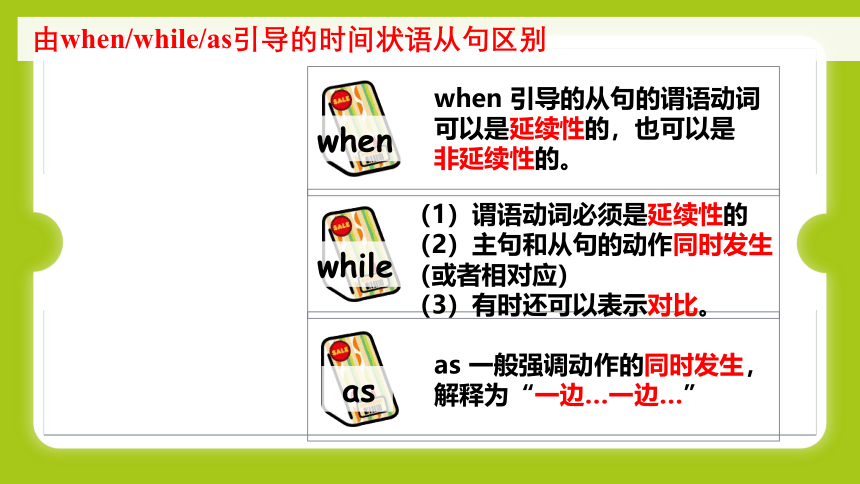
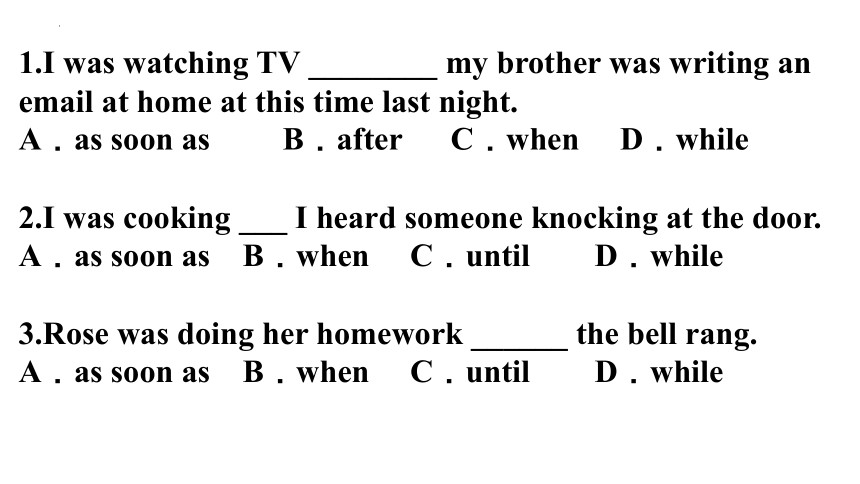

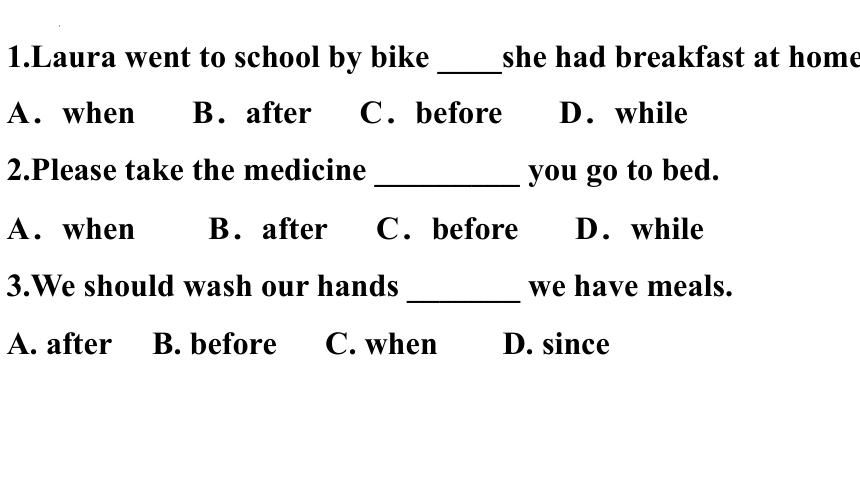
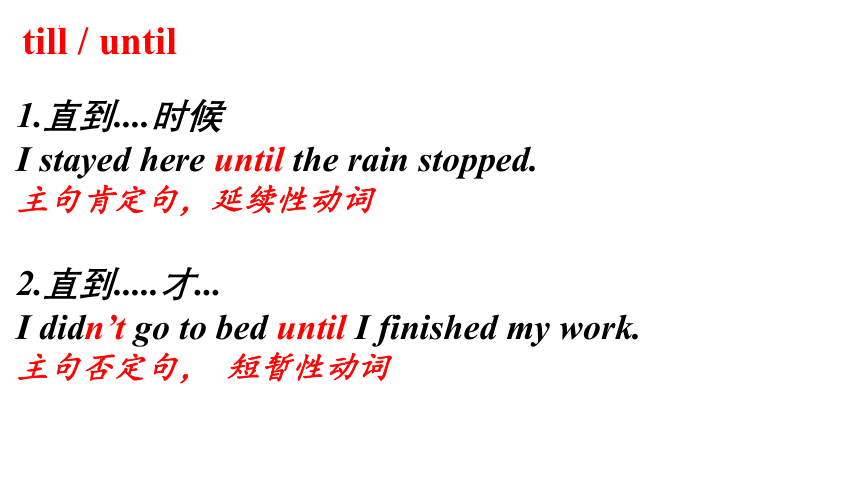
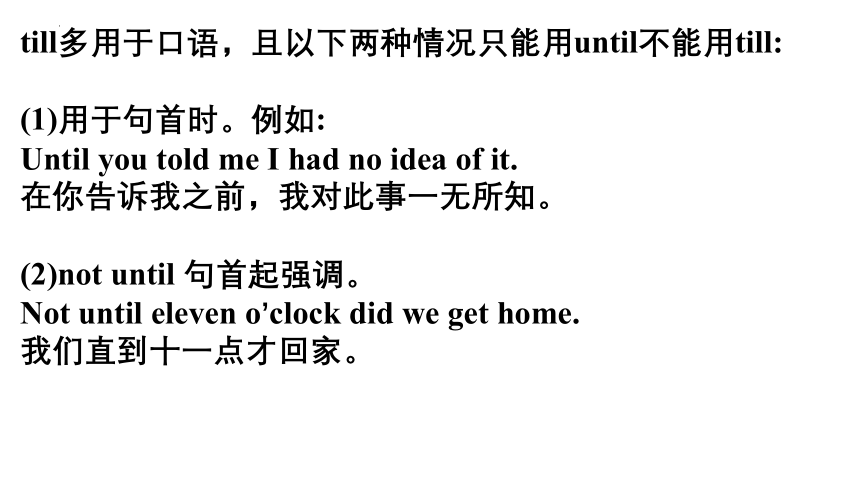
文档简介
(共31张PPT)
状语是用来表示状况的一种句子成分,用来描述事情发生的时间,地点,方式,目的等状况
He speaks English very well.
I come specially to see you.
She usually gets up at seven in the morning.
The boy was praised for his bravery.
She sits by the window,sewing .
当充当状语的部分是一个句子时,也就是状语从句
When she was 12 years old, she began to live in Dalian.
时间
01
02
03
05
07
08
09
种类
04
06
地点
原因
结果
条件
让步
比较
方式
目的
1.定义:
如果我们用一个从句来表达一件事情或一个行为发生的时间,那么这个从句就叫时间状语从句。
2.引导词:
时间状语从句
when/while/as;
before/after;
until; till
since;
as soon as...
each time/every time/whenever
when / while / as 当...时候
When you are crossing the street, you must be careful.
I feel very happy when you come to see me.
①when 意为“当……时”,引导的时间状语从句表示主句的动作和从句的动作同时或先后发生。
②when 引导的时间状语从句中,可以用延续性动词,也可以用短暂性动词。
He rushed in while they were discussing problems.
While he was making a phone call,I was writing.
① while 意为“当……”时引导的时间状语从句表示主从句的动作在同一时期发生,常用延续性动词。
注意:while 也可以作并列连词,表转折的关系,相当于but,译为“然而”
as: 一边....一边......
As I was doing my homework,
I was playing on the phone.
As they walked, they talked happily.
由when/while/as引导的时间状语从句区别
when 引导的从句的谓语动词
可以是延续性的,也可以是
非延续性的。
when
(1)谓语动词必须是延续性的
(2)主句和从句的动作同时发生(或者相对应)
(3)有时还可以表示对比。
while
when
while
as 一般强调动作的同时发生,
解释为“一边…一边…”
as
as
1.I was watching TV ________ my brother was writing an email at home at this time last night.
A.as soon as B.after C.when D.while
2.I was cooking ___ I heard someone knocking at the door.
A.as soon as B.when C.until D.while
3.Rose was doing her homework ______ the bell rang.
A.as soon as B.when C.until D.while
before / after
Before climbed the mountain, we drank some milk.
“在……之前”,表示主句的动作发生在从句的动作之前
After living in Paris for thirty years, he returned to the
small town.
“在……之后”,表示主句的动作发生在从句的动作之后
1.Laura went to school by bike ____she had breakfast at home.
A.when B.after C.before D.while
2.Please take the medicine _________ you go to bed.
A.when B.after C.before D.while
3.We should wash our hands _______ we have meals.
A. after B. before C. when D. since
till / until
1.直到....时候
I stayed here until the rain stopped.
主句肯定句,延续性动词
2.直到.....才...
I didn’t go to bed until I finished my work.
主句否定句, 短暂性动词
till多用于口语,且以下两种情况只能用until不能用till:
(1)用于句首时。例如:
Until you told me I had no idea of it.
在你告诉我之前,我对此事一无所知。
(2)not until 句首起强调。
Not until eleven o’clock did we get home.
我们直到十一点才回家。
I haven't heard from Jenny since she left middle school.
since
It is five years since we met last time.
It has been five years since we met last time.
since 意为“自从。。。”,表示主句的动作从过去某个时间开始一直延续到现在,所以主句必须用现在完成时,since从句用一般过去时。
as soon as
1. I will call you _________ I get to Beijing.
A.before B.while C.since D.as soon as
I will do some cleaning as soon as I________ my homework. A.finish B.will finish C.has finished D.finished
as soon as 意为“一……就……”,主将从现
◆相当于as soon as 用法的词或短语还有:immediately, directly, instantly, the moment, the minute, the instant等.
Whenever he has time , he likes playing football .
whenever / each time / every time
Every time I heard the other students talking and
laughing, I felt even more lonely.
I always drink coffee when I work.
When he gave me a present, I thanked him.
We will go out for a walk when the weather is fine.
主现从不限
主过从过
主将从现
since用现在完成时
时间状语从句时态总结
1.Aunt Lucy will tell us something about her trip to Australia when
she ______back.
A. came B. comes C. would come D. will come
2. They won't go home until they _______ their work.
A. finish B. will finish C. finishes D. has finished
3. We will have the party if the weather ______ fine.
A.will be B. is C. are D. was
4.Mr. Liu has taught us English _____ he came to our school.
A. until B. because C. though D. since
5.__ I saw the delivery man cycling towards me,I knew that was my
gift.
A. As B. Although C. Before D. While
原因状语从句
复合句中表示动作发生原因的句子即为原因状语从句
He didn’t come to school because he was ill.
As it is raining, we shall not go to the zoo.
Since you can’t answer the question, I’ll ask someone else.
连接词 语气 位置 (主句前/后) 意义
because 最强 后 “原因”;表客观因果关系。
as 较强 前 “由于”;把众人所知的事实当作理由。
since 较弱 前 “既然”;就对方陈述的事实作为理由。
注意:
because和so不能同在一个句子中。
because 后面要跟从句,而 because of 后面跟名词短语
条件状语从句
1.定义:
复合句中表示主句动作发生条件的句子即为条件状语从句
2.引导词:
if / as long as / unless
If it doesn’t rain tomorrow, we’ll go to the park.
If you want to pass the exam, you must study hard.
If you see him, please give him this note.
if 引导条件状语从句
主祁从现
主情从现
主将从现
注意:
if在宾语从句中翻译成“是否”
用动词的正确形式填空。
1. If she ____ (be) kind to me , I __________(not argue) with her.
2. I want to know if he ________(come) tomorrow, if he _________(come), I __________(give) the massage to him.
unless 引导条件状语从句
We will climb the mountain tomorrow unless it rains
除非,如果不
unless = if … not
As long as you don't give up, you will succeed.
as long as引导条件状语从句
只要
让步状语从句
让步状语从句表示即便出现从句中的情况,主句动作仍然会发生,有退一步说的意思
引导词:
I will try it , although I may fail.
Though he did not have much money , he was still happy.
although
though
even if/though
二者都可与yet,still连用,但不能与but连用
结果状语从句
结果状语从句用来补充说明主句动作发生所带来的结果
引导词:
so...that...
such... that...
The boy is so young that he cannot go to school.
It is such nice weather that I would like to go to the park.
so+adj/adv that....
so + adj+ a/an +n that...
so+many/much / few/ little +n that
such a/an+adj+n that....
such adj+n.s that...
such adj+uc that...
The boy is so young that he cannot go to school.
This is so interesting a book that we all like him.
There was so much food that we couldn’t eat them all.
It is such nice weather that I would like to go to the park.
注意:
so...that...可与too...to../ ...enough to do...互换
1. His mother was _____ busy ____ she can’t look after Tom.
A. so, that B. such, that C. very , that D. too, to
2. There is ____ little money that I can’t buy the shirt.
A. such B. so C. much D. many
3. He was ______ angry that he couldn’t say a word.
A. so B. too C. very D. much
4. He was ____ a little boy that everyone takes care of him.
A. so B. such C. many D. much
目的状语从句
目的状语从句用来说明主句动作发生的目的
They worked hard in order that they might succeed.He spoke loudly so that others could hear him clearly.
注意:
so that / in order that 可互换
so as to / in order to
地点状语从句
1、引导地点状语从句的连词有:where wherever eg. You may stay where you like.Wherever you go,I'll miss you.
注意区分where引导的定语从句和状语从句。eg.You'd better make a mark where you have problems.(状语从句)You'd better make a mark at the place where you have problems.(定语从句)
比较状语从句
I am taller than he is.
I am as tall as he is.
I am not so tall as he is.
as+adj/adv as
The more he eats, the fatter he gets.
方式状语从句
Do as I say.
He talked to them as if they were children.
She stared at me as though I were a complete stranger.
as as if / though 好像,像....
状语是用来表示状况的一种句子成分,用来描述事情发生的时间,地点,方式,目的等状况
He speaks English very well.
I come specially to see you.
She usually gets up at seven in the morning.
The boy was praised for his bravery.
She sits by the window,sewing .
当充当状语的部分是一个句子时,也就是状语从句
When she was 12 years old, she began to live in Dalian.
时间
01
02
03
05
07
08
09
种类
04
06
地点
原因
结果
条件
让步
比较
方式
目的
1.定义:
如果我们用一个从句来表达一件事情或一个行为发生的时间,那么这个从句就叫时间状语从句。
2.引导词:
时间状语从句
when/while/as;
before/after;
until; till
since;
as soon as...
each time/every time/whenever
when / while / as 当...时候
When you are crossing the street, you must be careful.
I feel very happy when you come to see me.
①when 意为“当……时”,引导的时间状语从句表示主句的动作和从句的动作同时或先后发生。
②when 引导的时间状语从句中,可以用延续性动词,也可以用短暂性动词。
He rushed in while they were discussing problems.
While he was making a phone call,I was writing.
① while 意为“当……”时引导的时间状语从句表示主从句的动作在同一时期发生,常用延续性动词。
注意:while 也可以作并列连词,表转折的关系,相当于but,译为“然而”
as: 一边....一边......
As I was doing my homework,
I was playing on the phone.
As they walked, they talked happily.
由when/while/as引导的时间状语从句区别
when 引导的从句的谓语动词
可以是延续性的,也可以是
非延续性的。
when
(1)谓语动词必须是延续性的
(2)主句和从句的动作同时发生(或者相对应)
(3)有时还可以表示对比。
while
when
while
as 一般强调动作的同时发生,
解释为“一边…一边…”
as
as
1.I was watching TV ________ my brother was writing an email at home at this time last night.
A.as soon as B.after C.when D.while
2.I was cooking ___ I heard someone knocking at the door.
A.as soon as B.when C.until D.while
3.Rose was doing her homework ______ the bell rang.
A.as soon as B.when C.until D.while
before / after
Before climbed the mountain, we drank some milk.
“在……之前”,表示主句的动作发生在从句的动作之前
After living in Paris for thirty years, he returned to the
small town.
“在……之后”,表示主句的动作发生在从句的动作之后
1.Laura went to school by bike ____she had breakfast at home.
A.when B.after C.before D.while
2.Please take the medicine _________ you go to bed.
A.when B.after C.before D.while
3.We should wash our hands _______ we have meals.
A. after B. before C. when D. since
till / until
1.直到....时候
I stayed here until the rain stopped.
主句肯定句,延续性动词
2.直到.....才...
I didn’t go to bed until I finished my work.
主句否定句, 短暂性动词
till多用于口语,且以下两种情况只能用until不能用till:
(1)用于句首时。例如:
Until you told me I had no idea of it.
在你告诉我之前,我对此事一无所知。
(2)not until 句首起强调。
Not until eleven o’clock did we get home.
我们直到十一点才回家。
I haven't heard from Jenny since she left middle school.
since
It is five years since we met last time.
It has been five years since we met last time.
since 意为“自从。。。”,表示主句的动作从过去某个时间开始一直延续到现在,所以主句必须用现在完成时,since从句用一般过去时。
as soon as
1. I will call you _________ I get to Beijing.
A.before B.while C.since D.as soon as
I will do some cleaning as soon as I________ my homework. A.finish B.will finish C.has finished D.finished
as soon as 意为“一……就……”,主将从现
◆相当于as soon as 用法的词或短语还有:immediately, directly, instantly, the moment, the minute, the instant等.
Whenever he has time , he likes playing football .
whenever / each time / every time
Every time I heard the other students talking and
laughing, I felt even more lonely.
I always drink coffee when I work.
When he gave me a present, I thanked him.
We will go out for a walk when the weather is fine.
主现从不限
主过从过
主将从现
since用现在完成时
时间状语从句时态总结
1.Aunt Lucy will tell us something about her trip to Australia when
she ______back.
A. came B. comes C. would come D. will come
2. They won't go home until they _______ their work.
A. finish B. will finish C. finishes D. has finished
3. We will have the party if the weather ______ fine.
A.will be B. is C. are D. was
4.Mr. Liu has taught us English _____ he came to our school.
A. until B. because C. though D. since
5.__ I saw the delivery man cycling towards me,I knew that was my
gift.
A. As B. Although C. Before D. While
原因状语从句
复合句中表示动作发生原因的句子即为原因状语从句
He didn’t come to school because he was ill.
As it is raining, we shall not go to the zoo.
Since you can’t answer the question, I’ll ask someone else.
连接词 语气 位置 (主句前/后) 意义
because 最强 后 “原因”;表客观因果关系。
as 较强 前 “由于”;把众人所知的事实当作理由。
since 较弱 前 “既然”;就对方陈述的事实作为理由。
注意:
because和so不能同在一个句子中。
because 后面要跟从句,而 because of 后面跟名词短语
条件状语从句
1.定义:
复合句中表示主句动作发生条件的句子即为条件状语从句
2.引导词:
if / as long as / unless
If it doesn’t rain tomorrow, we’ll go to the park.
If you want to pass the exam, you must study hard.
If you see him, please give him this note.
if 引导条件状语从句
主祁从现
主情从现
主将从现
注意:
if在宾语从句中翻译成“是否”
用动词的正确形式填空。
1. If she ____ (be) kind to me , I __________(not argue) with her.
2. I want to know if he ________(come) tomorrow, if he _________(come), I __________(give) the massage to him.
unless 引导条件状语从句
We will climb the mountain tomorrow unless it rains
除非,如果不
unless = if … not
As long as you don't give up, you will succeed.
as long as引导条件状语从句
只要
让步状语从句
让步状语从句表示即便出现从句中的情况,主句动作仍然会发生,有退一步说的意思
引导词:
I will try it , although I may fail.
Though he did not have much money , he was still happy.
although
though
even if/though
二者都可与yet,still连用,但不能与but连用
结果状语从句
结果状语从句用来补充说明主句动作发生所带来的结果
引导词:
so...that...
such... that...
The boy is so young that he cannot go to school.
It is such nice weather that I would like to go to the park.
so+adj/adv that....
so + adj+ a/an +n that...
so+many/much / few/ little +n that
such a/an+adj+n that....
such adj+n.s that...
such adj+uc that...
The boy is so young that he cannot go to school.
This is so interesting a book that we all like him.
There was so much food that we couldn’t eat them all.
It is such nice weather that I would like to go to the park.
注意:
so...that...可与too...to../ ...enough to do...互换
1. His mother was _____ busy ____ she can’t look after Tom.
A. so, that B. such, that C. very , that D. too, to
2. There is ____ little money that I can’t buy the shirt.
A. such B. so C. much D. many
3. He was ______ angry that he couldn’t say a word.
A. so B. too C. very D. much
4. He was ____ a little boy that everyone takes care of him.
A. so B. such C. many D. much
目的状语从句
目的状语从句用来说明主句动作发生的目的
They worked hard in order that they might succeed.He spoke loudly so that others could hear him clearly.
注意:
so that / in order that 可互换
so as to / in order to
地点状语从句
1、引导地点状语从句的连词有:where wherever eg. You may stay where you like.Wherever you go,I'll miss you.
注意区分where引导的定语从句和状语从句。eg.You'd better make a mark where you have problems.(状语从句)You'd better make a mark at the place where you have problems.(定语从句)
比较状语从句
I am taller than he is.
I am as tall as he is.
I am not so tall as he is.
as+adj/adv as
The more he eats, the fatter he gets.
方式状语从句
Do as I say.
He talked to them as if they were children.
She stared at me as though I were a complete stranger.
as as if / though 好像,像....
同课章节目录
- 词法
- 名词
- 动词和动词短语
- 动词语态
- 动词时态
- 助动词和情态动词
- 非谓语动词
- 冠词
- 代词
- 数词和量词
- 形容词副词及其比较等级
- 介词和介词短语
- 连词和感叹词
- 构词法
- 相似、相近词比较
- 句法
- 陈述句
- 一般疑问句和否定疑问句
- 特殊疑问句及选择疑问句
- 反意疑问句
- 存在句(There be句型)
- 宾语从句
- 定语从句
- 状语从句
- 主谓一致问题
- 简单句
- 并列句
- 复合句
- 主谓一致
- 主、表语从句
- 名词性从句
- 直接引语和间接引语
- 虚拟语气
- 感叹句
- 强调句
- 倒装句
- 祈使句
- 句子的成分
- 句子的分类
- 题型专区
- 单项选择部分
- 易错题
- 完形填空
- 阅读理解
- 词汇练习
- 听说训练
- 句型转换
- 补全对话
- 短文改错
- 翻译
- 书面表达
- 任务型阅读
- 语法填空
- 其他资料
